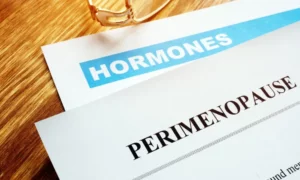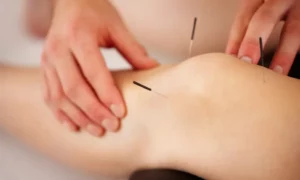Navigating the perimenopausal phase can be challenging for many women. Understanding and effectively managing perimenopausal symptoms is crucial for a smoother transition into menopause. In this article, we’ll delve into various treatments and lifestyle changes that can alleviate perimenopausal symptoms and enhance overall well-being.
Contents
What is Perimenopause? 
Perimenopause refers to the transitional phase leading up to menopause, which is the natural cessation of menstruation and the end of a woman’s reproductive years. It typically begins several years before menopause itself. Menopause is officially recognized when a woman has gone 12 consecutive months without a menstrual period.
During perimenopause, the ovaries gradually produce less estrogen, a key hormone involved in the regulation of the menstrual cycle. This hormonal fluctuation can result in various symptoms, such as irregular periods, hot flashes, night sweats, mood swings, difficulty sleeping, and changes in libido.
The duration of perimenopause varies for each individual, typically lasting around 4 to 8 years, but it can be shorter or longer. It usually begins in a woman’s 40s, although it can start in the late 30s or even earlier.
Identifying Perimenopausal Symptoms
Perimenopause is characterized by various symptoms that result from hormonal changes, particularly a decline in estrogen levels. Identifying these symptoms can help women recognize and manage the transition. Here are common signs of perimenopause:
- Irregular Menstrual Cycles
Changes in the menstrual cycle are a hallmark of perimenopause. Periods may become irregular, with variations in the length of the menstrual cycle and changes in flow. - Hot Flashes and Night Sweats
Sudden and intense feelings of heat, often accompanied by flushing and sweating, are common during perimenopause. Night sweats can disrupt sleep. - Mood Swings and Emotional Changes
Hormonal fluctuations can lead to mood swings, irritability, anxiety, and even depression in some cases. Emotional changes are common during perimenopause. - Sleep Disturbances
Difficulty falling asleep or staying asleep can occur during perimenopause. Night sweats, hormonal changes, and mood disturbances may contribute to sleep disruptions. - Changes in Libido
Some women may experience a decrease in sexual desire or changes in sexual satisfaction during perimenopause. - Vaginal Changes
Decreased estrogen levels can lead to changes in vaginal tissues, resulting in dryness, itching, and discomfort during intercourse. - Weight Gain
Hormonal changes and a slowing metabolism can contribute to weight gain, particularly around the abdomen. - Memory and Concentration Issues
Some women may experience cognitive changes, such as forgetfulness, difficulty concentrating, or “brain fog.” - Joint and Muscle Aches
Hormonal fluctuations may contribute to joint and muscle pain or stiffness. - Headaches
Some women may experience more frequent or severe headaches during perimenopause.
It’s important to note that not all women will experience the same symptoms, and the intensity can vary. If you suspect you are entering perimenopause and are experiencing bothersome symptoms, seeking guidance from a healthcare provider can help you navigate this natural life stage more comfortably.
Medical Interventions To Treat Perimenopausal Symptoms 
There are various medical interventions available to help manage and alleviate perimenopausal symptoms. The choice of treatment depends on the severity of symptoms, individual health considerations, and personal preferences. Here are some common medical interventions:
- Hormone Replacement Therapy (HRT)
- Estrogen Therapy: HRT involves the use of estrogen alone or in combination with progestin (for women with an intact uterus) to replace declining hormone levels. It can effectively relieve hot flashes, night sweats, and vaginal dryness. However, the decision to use HRT should be made in consultation with a healthcare provider, weighing the benefits and risks based on an individual’s health history.
- Low-Dose Antidepressants
- Certain antidepressant medications, such as selective serotonin reuptake inhibitors (SSRIs) and serotonin-norepinephrine reuptake inhibitors (SNRIs), have been found to help alleviate hot flashes and improve mood. These medications can be prescribed by a healthcare professional based on individual symptoms and needs.
- Gabapentin and Pregabalin
- These medications, commonly used to treat nerve pain, may also be effective in reducing hot flashes. They work by stabilizing electrical activity in the brain.
- Clonidine
- Originally a blood pressure medication, clonidine has been found to help manage hot flashes in some women. It is available in both oral and patch forms.
- Vaginal Estrogen Therapy
- For women experiencing vaginal dryness, itching, or discomfort during intercourse, localized estrogen therapy in the form of creams, rings, or tablets can be prescribed. This helps address symptoms without the systemic effects of oral estrogen.
- Bone Health Medications
- If there are concerns about bone density and osteoporosis, medications such as bisphosphonates or selective estrogen receptor modulators (SERMs) may be prescribed to support bone health.
- Cognitive Behavioral Therapy (CBT)
- CBT can be beneficial for managing mood swings, anxiety, and depression associated with perimenopause. It focuses on changing thought patterns and behaviours to improve emotional well-being.
Lifestyle Modifications to Treat Perimenopausal Symptoms
Lifestyle modifications play a crucial role in managing perimenopausal symptoms. Here are practical and effective changes that can help alleviate discomfort during this transitional phase:
- Healthy Eating
Adopt a well-balanced diet rich in fruits, vegetables, whole grains, and lean proteins.
- Regular Exercise
Engage in regular physical activity, including aerobic exercises, strength training, and flexibility exercises.
Exercise helps reduce hot flashes, improve mood, and maintain overall health.
- Adequate Sleep
Establish a consistent sleep routine and aim for 7-9 hours of sleep per night.
Create a comfortable sleep environment and manage stress to improve sleep quality.
- Stress Management
Practice stress-reducing techniques such as meditation, deep breathing, or yoga.
Identify and address sources of stress in daily life.
- Limit Caffeine and Alcohol
Reduce intake of caffeine and alcohol, as they can contribute to sleep disturbances and exacerbate hot flashes.
- Stay Hydrated
Drink plenty of water to stay hydrated, which can help manage symptoms like headaches and fatigue.
- Maintain a Healthy Weight
Strive for a healthy weight through a combination of a balanced diet and regular exercise.
Weight management can positively impact hormonal balance and overall well-being.
- Quit Smoking
If applicable, quit smoking, as it can exacerbate symptoms like hot flashes and increase the risk of other health issues.
- Mindfulness and Relaxation Techniques
Practice mindfulness to stay present and reduce anxiety.
Relaxation techniques, such as progressive muscle relaxation, can help manage tension.
- Regular Health Check-ups
Schedule regular check-ups with a healthcare provider to monitor overall health and discuss perimenopausal symptoms.
- Hormone-Disrupting Chemicals
Minimize exposure to hormone-disrupting chemicals found in certain plastics and household products.
Opt for natural and environmentally friendly alternatives when possible.
- Bone Health
Ensure an adequate intake of calcium and vitamin D for bone health.
Consider supplements if necessary, under the guidance of a healthcare professional.
Alternative Therapies 
Several alternative therapies and lifestyle modifications may help manage perimenopausal symptoms. While these approaches may not be universally effective, some women find them beneficial in alleviating discomfort. It’s essential to consult with a healthcare professional before trying any alternative therapy, especially if you have underlying health conditions. Here are some alternative approaches:
- Herbal Supplements
Black Cohosh: May help with hot flashes, but scientific evidence is mixed.
Soy and Red Clover: Contain phytoestrogens, which some women find helpful for symptoms.
- Dietary Changes
Balanced Diet: Emphasize fruits, vegetables, whole grains, and lean proteins.
Calcium and Vitamin D: Important for bone health; consider supplements if needed.
- Acupuncture
Involves thin needle insertion at specific points.
Some report relief from hot flashes and sleep disturbances.
- Mind-Body Practices
Yoga and Tai Chi: Improve flexibility, reduce stress, and manage mood swings.
Meditation and Relaxation Techniques: Help with stress and emotional balance.
- Physical Activity
Regular exercise reduces hot flashes, improves mood, and maintains overall health.
Combine aerobic, strength training, and flexibility exercises.
- Biofeedback
Learn to control physiological functions like heart rate and muscle tension.
Can improve symptoms such as hot flashes and anxiety.
- Chiropractic Care and Massage
May alleviate muscle and joint pain associated with perimenopause.
- Aromatherapy
Essential oils (e.g., lavender, chamomile) may help with insomnia and stress.
It’s crucial to approach alternative therapies with caution and discuss them with a healthcare provider, as some may interact with medications or have potential side effects. Additionally, what works for one person may not work for another, so a personalized approach is important. Integrating a combination of lifestyle modifications, alternative therapies, and medical interventions may provide the most effective symptom management during perimenopause.
Conclusion
In conclusion, navigating the perimenopausal journey is undoubtedly an individual experience for every woman. Understanding and managing perimenopausal symptoms requires patience, self-compassion, and a willingness to explore different avenues. It’s crucial for women to listen to their bodies, consult with healthcare professionals, and build a support system that understands and embraces the challenges of this transitional phase.
If you are facing menopause related issues, menopause treatment at HerMantra can help. Book your free trial online menopause treatment session now.





